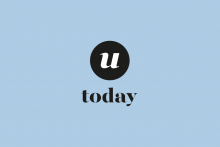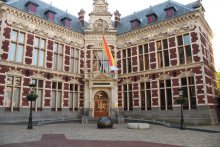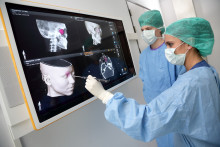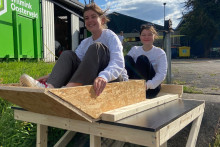Sonja is one of the two Serbian students studying at the university of Twente for one year in the light of the 'Education for Democracy' project, set up by students of the European student association AEGEE.
The project aims to support the process of democratisation in the federal Republic of Yugoslavia, by on the one hand, offering ten Serbian and Kosovo-Albanian students the chance to study under normal circumstances, and on the other, to set up a series of weekend seminars during which the students will discuss topics like democracy, conflict management, mediation etc. with experts in the field. The ten students have been placed in nine universities in The Netherlands and in Germany. The universities support the project by offering scholarships, accommodation and not charging any tuition fees.
Sonja has been in Enschede since 9 September. She normally lives in the centre of Belgrade and studies International Relations. For her, the opportunity to take part in this project is very important for several reasons. One of these is that she wants to see how a democratic nation functions so that she can spread this information when she returns to Serbia. Besides that, she also wants to show the Dutch that she too is just an ordinary student. Another important reason for her to participate in the project is that she, as a student of International Relations, feels it is very important to spend some time studying in another country than Serbia. To Dutch students, this may sound logical, but in Serbia it is not.
Sonja says: 'Serbia is a closed country and there are few chances to study abroad. Not even when studying International Relations. All students in Serbia hope that this will change.'
She feels it is very important to experience a normal way of life so that she can take that knowledge with her when she returns to Serbia. In Serbia she, and other students with her, have been trying hard to change the system. With respect to the recent political changes in Serbia, Sonja says it was hard to watch it all happen on television. She normally lives in the centre of Belgrade and now saw all those people, including all her fellow students, making it happen. 'It was quite difficult to watch the changes being made that we have been trying to achieve for years without being able to participate, but we did celebrate them here too.'
'The revolution was caused by a real change in peoples' minds and that is what was needed,' she continues. One of the things that she is especially pleased with, is the fact that the students are now changing the university rules, which were very restrictive, and, for Milosevic, were a way to limit the autonomy of universities. Students are now asking professors and all others that were expelled because of their political beliefs, to come back to university. They have even made their dean, who supported Milosovic, resign. The first steps towards democracy have been made.








